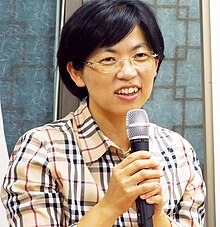Ли Юнг-хи
Эта статья имеет несколько вопросов. Пожалуйста, помогите улучшить его или обсудить эти вопросы на странице разговоров . ( Узнайте, как и когда удалить эти сообщения )
|
Ли Юнг-хи | |
|---|---|
Ли Юнг -Хи | |
 | |
| Personal details | |
| Born | December 22, 1969 Seoul, South Korea |
| Political party | Unified Progressive Party |
| Spouse | Shim Jae-hwan |
| Occupation | Politician, lawyer, activist |
| Korean name | |
| Hangul | 이정희 |
| Hanja | |
| Revised Romanization | I Jeong-hui |
| McCune–Reischauer | Yi Chŏnghŭi |
Ли Юнг-хи ( корейский : 이정희 ; Ханджа : 李正姬 ; родился 22 декабря 1969 г.)-южнокорейский политик, адвокат и активист. Она была членом 18 -го национального собрания Южной Кореи . Она была одним из кандидатов на президентские выборы 2012 года .
Биография
[ редактировать ]Early years
[ редактировать ]Lee was born in Seoul in 1969. A graduate of Somun Women's High School and Seoul National University, she joined the student movement in 1992. During her early years, she was a human rights, workers' rights, and women's rights activist.
Political activities
[edit]In 2007 she joined the Democratic Labor Party. She was elected as a member of the National Assembly in 2008.[1]
In 2008 she was Vice Leader of Democratic Labor Party and next year was elected as the Democratic Labor Party's leader. In 2011, the DLP joined with other parties to form the Unified Progressive Party (UPP).
Lee Jung-hee was the UPP candidate in the 2012 South Korean presidential election. Lee admitted her entry in the race was mainly to castigate Park Geun-hye, the Saenuri Party candidate, whom she called the "first lady of the dictatorial era".[2] Although she polled less than one percent, she was invited to join the presidential debate because her party had more than five seats in the National Assembly.[3] In the debate, she drew controversy by referring to Park's father, former president and dictator Park Chung Hee, by his Japanese name; and by referring to the government in Seoul as "the government of the South"— a phrase rarely used in South Korea but commonly used by North Korea. Her performance was thought to have damaged fellow left-wing candidate Moon Jae-in's chances.[3] On December 16, three days before the election, she withdrew from the contest, "in accordance with the people's hope for integrating (opposition) progressive, democratic and reform-minded forces to achieve a change of government" and warned that Park's victory would mean an "irrevocable regression of history".[4] Park ultimately won the election; analysts suggested that Lee's attacks motivated the conservative Saenuri voters to turn out for Park.[5]
On September 2, 2013, Lee declared that she would go on hunger strike to protest what she called the “witch hunt” against UPP member Lee Seok-ki, whom the National Intelligence Service charged with planning armed rebellion against the South Korean government.[6]
On December 19, 2014, the Constitutional Court of Korea dissolved the UPP, finding the party "aimed at using violent means to overthrow our free democratic system"; it was the first time the constitutional court of Korea banned a political party since 1988. Lee Jung-hee denounced the decision, saying it "opened a dark age with an authoritarian decision" and turned South Korea into a "dictatorial country".[7][8]
On April 8, 2020, Lee appeared on the official youtube for the Minjung Party and expressed support for the Minjung party in the 2020 South Korean legislative elections.[9]
Books
[edit]- Love and Song and sick (2010)
- Future advances
- Learned woman
See also
[edit]References
[edit]- ^ 불가사의한 에너지, ‘초선의원 노무현’의 재림 Archived 2013-02-02 at archive.today, SisaSeoul, 5 February 2010
- ^ Chico Harlan (12 December 2012). "S. Korea's presidential contenders have near-opposite backgrounds". Washingtonpost.com.
- ^ Jump up to: a b "Far left outsider "winner" in Korean presidential debate". Reuters. 2012-12-05. Retrieved 2020-05-12.
- ^ "Left-leaning presidential candidate Lee Jung-hee quits race". Yonhap News Agency. 17 December 2012. Archived from the original on 19 December 2012. Retrieved 17 December 2012.
- ^ ‘노골적 反朴’ 이정희 되레 朴당선에 기여?, The Dong-a Ilbo, 20 December 2012
- ^ Yoon, Min-sik (2 September 2013). "UPP leader goes on hunger strike, protests 'witch hunt'". The Korea Herald. Retrieved 2 September 2013.
- ^ "South Korea court bans 'pro-North' political party". Bbc.com. 19 December 2014.
- ^ Choe Sang-Hun (19 December 2014). "South Korea Disbands Party Sympathetic to North". The New York Times.
- ^ "[2020총선] 이정희, 6년만에 공식석상 등장…"민중당 지지해달라"". Hankyoreh. 2020-04-08.
External links
[edit]- Unified Progressive Party (in Korean)
- Lee Jung-hee's Blog (in Korean)
- Lee Jung-hee (in Korean)
- http://www.koreaherald.com/view.php?ud=20141219000476
- 1969 births
- Living people
- Democratic Labor Party (South Korea) politicians
- South Korean human rights activists
- Members of the National Assembly (South Korea)
- Politicians from Seoul
- Seoul National University alumni
- 20th-century South Korean lawyers
- South Korean presidential candidates, 2012
- 21st-century South Korean women politicians
- 21st-century South Korean politicians
- South Korean women's rights activists
- Left-wing nationalism in South Korea
- Workers' rights activists
- South Korean atheists
- South Korean women lawyers
- Women members of the National Assembly (South Korea)